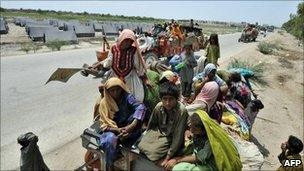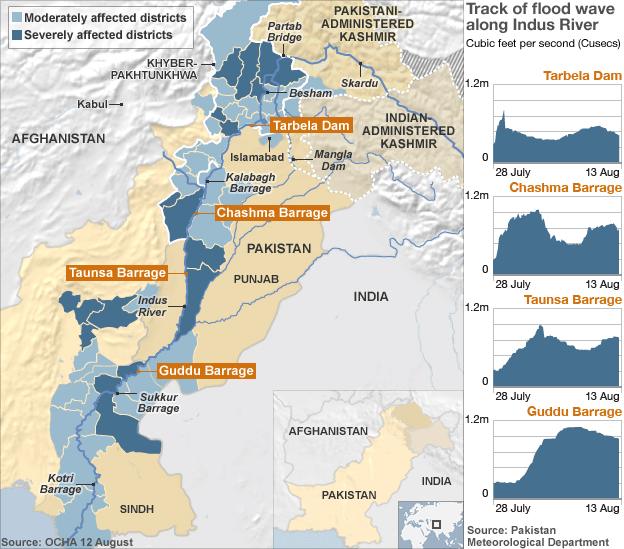Pakistan floods: Two 'major peaks' due on Indus river
- Published
Flood survivors are on the move and gathering in camps in Pakistan
Flood levels in Pakistan are expected to surge even higher along parts of the already dangerously swollen Indus river.
The National Disaster Management Authority (NDMA) said "major peaks" were expected on Friday and next week in Punjab and Sindh provinces.
The region's worst flooding in 80 years has affected 14 million people and killed 1,600, according to the UN.
Doctors say that malaria, diarrhoea and gastroenteritis are growing threats.
On Friday, President Asif Ali Zardari said he would go ahead with a visit to Russia next week, but would stay only a few hours instead of the scheduled two days. It comes after he was heavily criticised for failing to cut short a visit to Europe last week, amid his country's worsening crisis.
Meanwhile, Pakistan's PM has promised aid distribution will be transparent, after criticism of the government's handling of the two-week-old crisis.
Disease fears
NDMA spokesman Ahmed Kamal said: "There can be further devastation as we are expecting two major peaks in the Indus system.
He said places downstream of the Kotri barrage - a flood barrier in Sindh - and areas on either side of the Taunsa barrage in Punjab were likely to take the brunt of this surge.
President Zardari and Prime Minister Yousuf Raza Gilani are reported to have held an emergency meeting on Thursday night to review the government's much-criticised response.
Mr Zardari made his first visit to the disaster zone on Thursday in an effort to defuse public anger over his handling of the flooding. He toured a relief camp at Sukkur in Sindh.

The region's worst flooding in 80 years has affected 14 million people
Opposition politicians said the trip by the president - who was widely condemned at home for pressing ahead with a trip to Europe while the floods crisis unfolded - was too little, too late.
Mr Zardari will now visit affected areas in Khyber Pakhtunkhwa and Punjab provinces on Independence Day on Saturday, a presidential spokesman has said.
The spokesman said that in view of the crisis, "no Independence Day celebrations will be held in the presidency this year".
UN Secretary-General Ban Ki-moon is scheduled to arrive in Pakistan on Saturday and will hold talks with officials and visit flood-affected areas the following day.
The UN on Wednesday launched a $459m (£294m) appeal for emergency aid but says billions will be needed in the long-term.
Meanwhile, medics in a relief camp in southern Punjab told the BBC the main challenges they face are gastroenteritis, diarrhoea and skin infections.
But they are also increasingly worried about malaria, which is being worsened by all the stagnant water.
As a US ship with more helicopters and 1,000 Marines arrived to boost the relief efforts, Pakistan's political leaders pledged that all aid distribution would be transparent.
Prime Minister Gilani said: "Whatever you give, we will give an account of every single penny."
BBC World Service's Newshour will broadcast a one-hour programme on the Pakistan floods, hosted by Lyse Doucet from Karachi, at 1200 GMT on Saturday 14 August.
